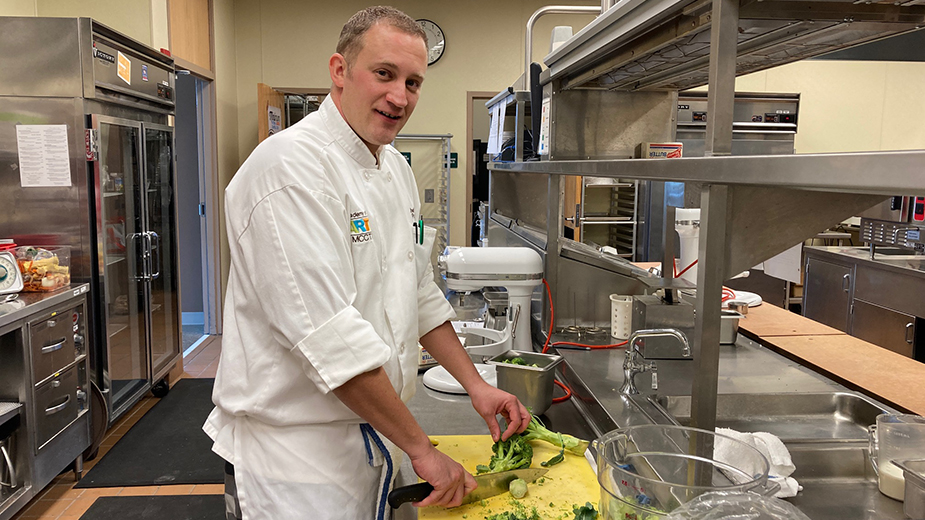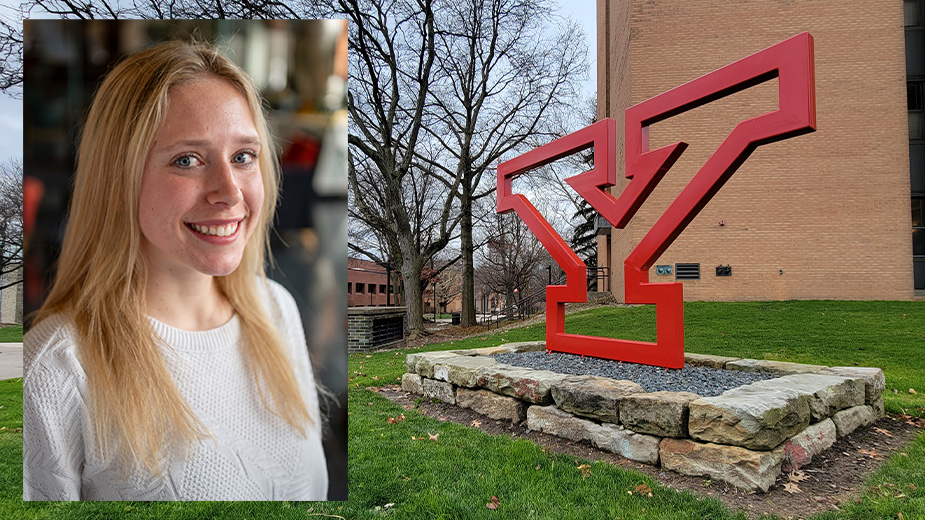Culinary Students Cook Up Careers
YOUNGSTOWN – Tyesha Evans has worked in the restaurant industry for a long time and always knew there was a better way to do things than the way she was taught.
That’s why when Laurel Technical Institute launched a culinary arts program in September at its Sharon, Pa., campus, she jumped at the chance to enroll.
Evans, who is in her early 30s, was the program’s first student and also its only one until January, when four more started their studies.
“I was very excited to learn this was available,” the Farrell native says, “because I wanted to go to culinary arts school right after high school.”
Her plans were delayed when she became pregnant. She could no longer attend school outside the area and there was no postsecondary culinary program in the Mahoning or Shenango valleys.
Chef Roger Clatterbuck is the director of the culinary arts diploma program at LTI and the main instructor. He brings decades of experience to the school as an educator, chef and restaurant owner.
Clatterbuck, a Youngstown native, moved back to his hometown 18 months ago to get the LTI program off the ground.
A graduate of the prestigious Culinary Institute of America in Hyde Park, N.Y., he worked in restaurants in New York City for 15 years, and later in Asheville, N.C.
Clatterbuck moved on to work as chef and director of purchasing at both the Nemacolin and The Greenbriar resorts in Pennsylvania and West Virginia, respectively.
Clatterbuck also owned and operated two restaurants in the Uniontown, Pa., area, near the Nemacolin.
He admits there are challenges to launching a new culinary school in the middle of a pandemic. There is also an upside.
“The good thing about doing it now is that many people are not working and they [have time to] get retrained,” he said.

The LTI program has three start dates each year when new students can begin. Clatterbuck expects enrollment will continue to grow with the summer and fall dates.
Graduates of the one-year program receive a culinary arts diploma. The program has a capacity of 15 students per semester, with a total of 45 in the rotation.
Like all culinary schools, the LTI program has a spacious commercial kitchen with several six-burner ranges, ovens, broilers, a convection oven and deep fryers.
But what sets it apart might be the LTI horticulture and botany program, where students learn to grow herbs, spices and vegetables. Culinary students use that produce in their cooking classes.
The indoor growing area will be augmented with a large outdoor garden this summer, Clatterbuck says.
A baking curriculum will be added this spring with the hiring of a part-time instructor.
Between the “reasonable” tuition and financial aid that is available to students, the LTI program is “very accessible,” he says.
Culinary training requires real-world experience, and to provide it, LTI will open a restaurant, Gigi’s Table, later this month.
The restaurant, on the LTI campus on Sterling Avenue, downtown, will have its own entrance and parking area. Dine-in lunch service will be open to both students and the community Tuesday through Friday, with takeout dinners also in the plan.
Internships with outside restaurants are also part of the curriculum.
Getting an Early Start
Young people throughout the region seeking a culinary career can also get that education at the high school level. The career and tech schools for students in Mahoning, Trumbull, Columbiana, Mercer and Lawrence counties offer culinary arts programs, as does Choffin Career Center in the Youngstown school district.
Matthew Putzier has been a culinary instructor at Mahoning County Career and Technical Center in Canfield for 14 years. He came on board as the school was re-creating its physical space, and helped to design it.
The new kitchen, he says, sits directly behind the program’s restaurant, The Bistro at MCCTC, which has its own entrance from the parking lot. The Bistro serves the public as well as MCCTC students and staff.
It’s open Tuesday through Thursday from 11 a.m. to 1 p.m. although it is temporarily closed because of the pandemic.
Putzier sees it as the centerpiece of the program, providing real-world experience in every phase.
“A student greets you when you walk in. You have student servers. And they work every job in the front and back of the house – sanitation, dishwasher, everything,” Putzier says. “It’s much like the industry for both students and customers. A server punches in the order on the microsystem and they get it on a printout out back.”
An average lunch check is $10, and daily revenue ranges from $400 to $800. “I tell the students that there are restaurants around here that aren’t doing this well,” Putzier says.
An upside to the restaurant being temporarily closed is there is more time for students to learn every recipe.
“They’re getting to focus more on the products but they’re missing the customer service and the real-world fast pace, the ‘not knowing what’s going to walk through the door’ experience. It could be a five-top, it could be a 10-top,” Putzier says, referring to the size of a dining party.
MCCTC’s building also has a large events center, and culinary students can work there to get banquet catering experience.
Students at all tech schools are encouraged to get jobs in the culinary industry after classes to complement their education. “What I talk about in here completely correlates with the industry,” Putzier says.
The culinary program has 40 students, split evenly between juniors and seniors. It has a capacity of 48.
The older, original kitchen is used to teach baking, with classes led by instructor Christal DeNiro.
Putzier, a graduate of Lorain County Career and Technical Center, worked in the restaurant industry in Cleveland before joining MCCTC.
Culinary education, like the industry, has evolved since Putzier arrived at MCCTC.
When technical schools were being built across the state in the early 1970s, the focus of their culinary programs was “institutional, large-batch kitchens,” he says. “[At that time,] the fine dining aspect hadn’t really hit, much less trickled down to high schools.”
Food trucks have also exploded in popularity in the last decade, and MCCTC is pondering acquiring one in order to add it to the curriculum, says Jessica Cene, community outreach coordinator at the school.
TCTC Success Story
Tiffany Daley is one of two culinary arts instructors at Trumbull Career and Technical Center in Warren. The other is Jim Antenucci, who was Daley’s instructor when she was a high school student attending the TCTC culinary program.
Daley, in fact, is one of the program’s top success stories.
The 1999 graduate from the Lake-view School District is also the owner-operator of Breakfast at Tiffany’s restaurant in Sharpsville, Pa., which she opened 17 years ago.
Most of her students at TCTC go straight to work in the field or enroll at a postsecondary school. Some join the military, but all are well-versed in food production and hospitality.
Daley sees TCTC’s culinary program as “a stepping stone for anyone who would like to pursue the field.”
She started teaching there 12 years ago as a substitute and was eventually offered a full-time instructor position.
“My diner was on good legs even if I was not overseeing it and I said ‘yes,’” she says. “The moment I knew that I was meant to do this was when the job was posted and I was worried that I’d never see these kids again.”
Daley feels an attachment to TCTC’s culinary program and wants to inspire the students.
“I am proud of this school,” she says. “I love my diner. I love my community and the opportunity to teach these kids and tell them that they can succeed. I am dyslexic and I tell the kids that you can still have a career.”
TCTC’s culinary program has 13 juniors and 14 seniors this year.
Virtual Sampling at Choffin
Although all classes at Choffin Career Center in Youngstown have been remote this year, culinary arts instructor Tricia Goodnough has found ways to make the most of the time.
“I am an out of the box thinker,” she says. “We take virtual field trips. We’ll visit a restaurant or have their chef talk to the students by Zoom and show us the kitchen or cook something.”
The graduate of the culinary program at Johnson and Wales University in Providence, R.I., has also had colleges – including her alma mater – give virtual field trips.
“The students could see the college setting and make decisions as to whether to attend,” Goodnough says.
The Cortland native has also taught classes via Zoom from her own kitchen.
“Originally I was doing all lectures and I couldn’t take it,” she says. “So I got into my kitchen and developed lessons based on what I was making at home for dinner, and talked about how to change it for someone who has a gluten or nut allergy. For Thanksgiving, I did the meal prep and taught them how to make stuffing, cranberry sauce and sweet potato casserole.”
Choffin’s culinary program, which serves Youngstown City Schools, currently has 32 students split between the junior and senior class. Half of them work in restaurants after school, Goodnough says.
Pictured: Matthew Putzier, an instructor in the culinary arts program at Mahoning County Career and Technical Center, works in the kitchen.
Copyright 2024 The Business Journal, Youngstown, Ohio.



